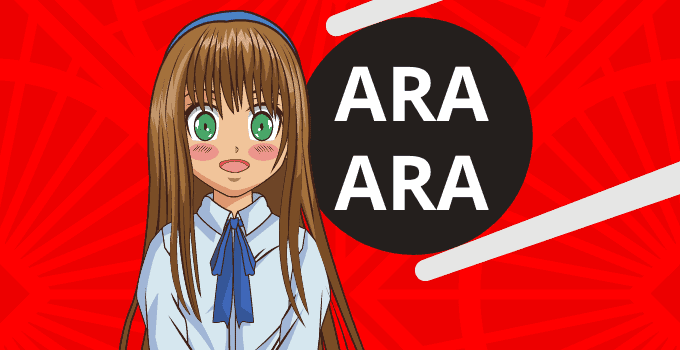This article looks at a simple interjection in Japanese, ara-ara.
While simple, it definitely has some guidelines to be aware of and pitfalls to avoid, not to mention some easy confusions.
Don’t worry, we’re going to tackle all of it.
Let’s start simple…
What’s the meaning of ‘ara ara’ in Japanese?
‘Ara ara’ is a Japanese interjection mainly used by women to express surprise or amusement, similar to ‘Oh-ho’ or ‘Hmm’ in English. Popular in anime, it often characterizes a mature, flirtatious personality.
So, there’s three words that share the same pronunciation of ara-ara in Japanese.
They also share the fact that they can be broken down into single utterances of “ara.” So, let’s take a look at each one, what it means, and how to write it.
We’ll end up exploring six very different words that are all pronounced “ara” inside the Japanese archipelago.
First, an interesting outlier!
The not-Japanese “ara” used in Japan!
Many people think of Japan as a wholly homogeneous society—same culture, same religion, same race, same language. But this assumption falls wide of the mark!
There are several different languages (including highly divergent dialects of Japanese) native to the lands that currently make up the nation of Japan.
One of those languages is Miyako, a linguistic offshoot of the Ryukyuan languages.
Ryukyuan languages are still spoken to some extent (over one million native speakers!), and mostly in Okinawa, the southernmost prefecture in Japan.
In the Miyako language, ara is written in hiragana as あら and refers to the husk of a fruit.
A singular fish!
The niphon spinosus, aka the Sawedged perch is a fish that swims the waters from Japan all the way to the Philippines.
In Japanese it’s known as ara. This word can be written in either hiragana or katakana as あら or アラ, respectively.
It’s also written in kanji as ?.
That kanji is convenient for us, because it’ll lead us into our next word. Let’s break it down real quick first. The left side is just a squished 魚, the character for “fish.” The right side is 荒, a character that can mean “rough,” “rude,” or “wild.”
[adinserter name=”Block 14″]
If you look up a picture of the sawedged perch, you can imagine why it got saddled with a kanji that basically means “rough fish.”
One word, two kanji
So, for our next “word,” we end up with a few different definitions. However, they all fall under the pronunciation ara and can be written with 荒. They can also be written with the kanji 粗.
粗 is a “phono-semantic” kanji, meaning the component parts add up to give you meaning and pronunciation.
The right side is 且 which gave the pronunciation in Old Chinese (it’s no longer relevant). The left side is 米 which means “rice.”
粗 and 荒 mean a few things. It can mean “the bones from a filleted fish,” “a personal defect,” or “rice chaff.” It can also be used as a prefix to mean “rough” or “natural/wild.”
Ara as interjection
Ara is used by women to express surprise. It translates well as “oh!” or “ah!”
Ara as a surname
Ara can also be found as a surname in Japan, though how common it is I’m not sure.
Sources suggest that when written as a name, the characters used are either 荒 or 新 (which means “new”).
Doubling up! Ara-ara!
Here’s what happens when these get doubled.
粗粗 (alternatively written 粗々) is an adverb that means “roughly.”
荒荒 (alternatively written 荒々) is always followed by by a little grammatical add-on. 荒々しい is pronounced ara-ara-shii and is an adjective meaning “rough,” “rude,” “harsh,” or “wild.”
If you write it 荒々しさ it’s pronounced ara-ara-shisa and is a noun meaning “roughness,” “rudeness,” “harshness,” or “wildness.”
[adinserter name=”Block 14″]
The interjection can be doubled in two ways.
First, we can simply double the final syllable, giving us arara, meaning basically the same thing as ara.
Second, we can double the whole thing to become ara-ara, which is a stronger sense of surprise and curiosity. It can also have a bit of a teasing effect.
This interjection can also be written and pronounced as are-are (あれあれ), arere (あれれ), or arya-arya (ありゃありゃ).
Ara ara meaning in anime
Ara ara is a phrase often used in anime and roughly translates to “my my” or “tsk tsk”. In anime, it is most often used by attractive female characters and mothers. The connotations can span from flirtatious to pity depending on the context.
“Ara ara” (あら あら) is a phrase that is often used by mothers in Japan. It is used for short phrases such as oh-no, uh-oh, or my-my when speaking to children to indicate a softer tone.
It is used by an older person to a younger person, and often denotes a bit of pity for their situation.
Many mothers, grandmothers, and villagers in anime will use it when speaking to children. This is especially true when the children are down on their luck (and goodness knows many anime children are!)
Ara ara used while flirting in anime
Ara ara can also be used in a flirtatious way, which is where the phrase is often used in anime.
“Ara ara” spoken in a flirty tone still carries with it the connotations of being spoken to like a child, and being pitied.
Situationally, a beautiful older woman might say “ara ara, you look like you need a drink” or “ara ara, don’t look so sad. Your face is too cute to waste.”
To be perfectly clear, not every instance of ara ara is flirtatious. Mothers and Grandmothers in Japan will use this phrase often, as it exists to make words softer gentler toward younger people.
The meaning of ara ara ii ko da ne
The phrase ara ara ii ko da ne (あら あら良い子だね) translates to “Oh my, you’re a good child, aren’t you?” It’s a phrase that an older person says to a younger person, and denotes pride and happiness toward a child.
Ara ara (あら あら) means “my my” or “oh my”.
ii (良い) means “good”.
Ko (子) means “child”.
Da ne (だね) is a question marker asking if the listener agrees, such as “aren’t you?” “aren’t I?” or “isn’t it?”.
Put together, the phrase means “Oh my, you’re a good child aren’t you?” This would be used if a child helps their younger sibling, does their chores, or does well in school.
Ara ara in Demon Slayer
“Ara ara” is a phrase used by multiple characters in the popular anime Demon Slayer. It is a term with a maternal feel to it meaning “my my…” or “tsk tsk” and is typically used toward children or those acting chilldish in a pitiable, cute way.
The phrase “ara ara” is used by multiple female characters in Demon Slayer.
Warabihime (Daki) uses “ara ara” when two children are arguing in front of her. The meaning of this small phrase is something akin to “my my, kids will be kids”.
Kanae Kocho uses “ara ara” when saving a child from a slave-dealer. The old man is throwing a tantrum, so she smiles and says “ara ara!”. This insinuates that he is acting like a child.
Shinobu uses “ara ara” when a lower ranking demon slayer is intimidated by her, and runs away. Because of his lower ranking and childish antics, she lets out a soft “ara ara, sayonara!”. This translates to “My my… goodbye!”

“I’ve lived in Japan on-and-off for the last five years, travelling to (almost) every corner of the Land of the Rising sun. I’ve deepened my love of the language with big hauls from Sapporo book stores, by chatting in Shinjuku coffee shops, drinking in Osaka “snack bars,” exploring distant Okinawan islands, and hitching rides with monks in Aomori. Japanese is a wide and deep language, and I’m always eager to dive in deeper.”

